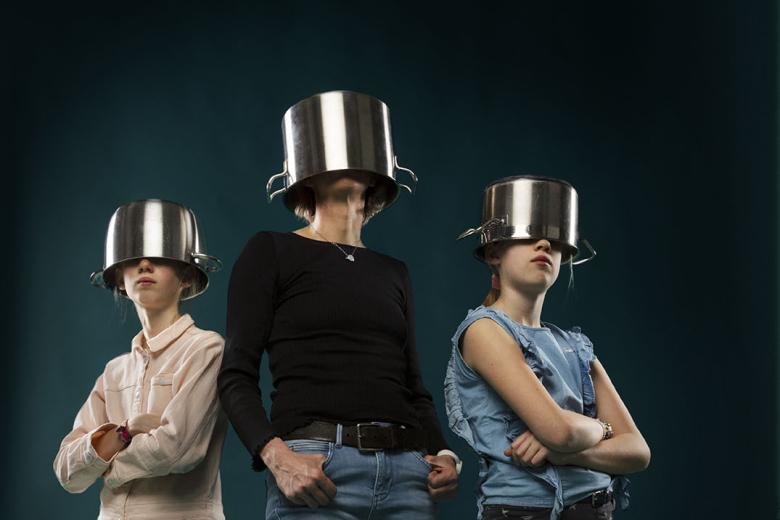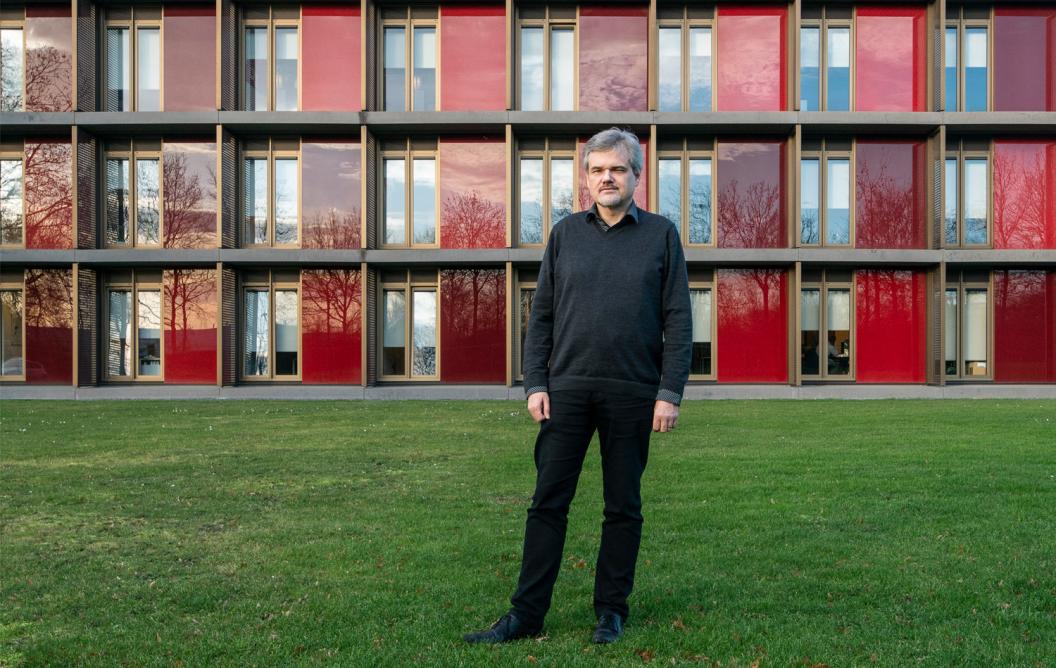Rainer Goebel: A career on solid ground
His nickname at high school was Zweistein, which made Rainer Goebel feel honoured. “Nobody matches Einstein; Zweistein was getting close.” His fellow students were not the only ones to recognise Goebel’s brainpower: Stanford University, once his dream institute, has tried to lure him to the States on more than one occasion. “But I’m happy with my choice for Maastricht back in 2000”, he says. An academic overachiever, the Netherlands’ first Tesla driver and hacker of the first iPhone, Goebel is also a farmer’s son and a family man.
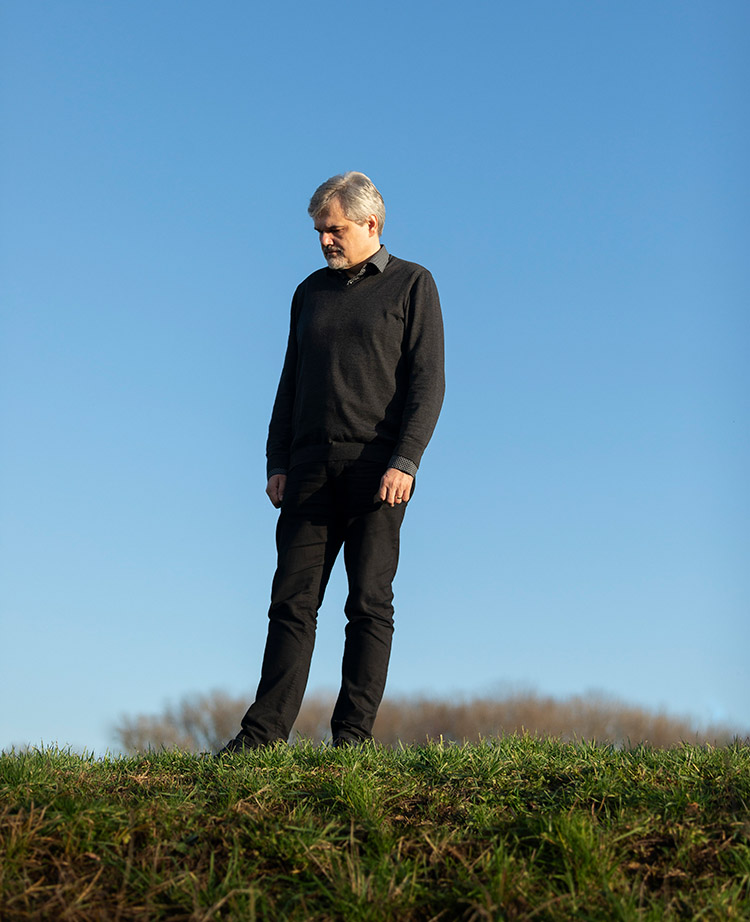
And he is the reason that Maastricht is home to Brains Unlimited: an imaging facility with one of the only two working 9.4 Tesla fMRI scanners in the world. Not because he asked for it: his parents raised him to be modest. But when he told the Executive Board’s Jo Ritzen in 2009 that he would have to transfer to Amsterdam, where the university was ready to build a 7 Tesla facility for him which UM could never afford, Ritzen replied: “You’ll stay here and we’ll create something even better.”
It started with a Commodore64
Goebel gave UM the benefit of the doubt, perhaps also because he recognised Ritzen’s bluff. In a similar way Goebel had, in his last year at high school, convinced his father to buy him a Commodore64 computer. “Until then I’d been programming small games on my calculator. My father was active in politics and he wanted to have bar charts like the ones you see on television after elections.”
Goebel didn’t know how to make them, but his parents, like so many of his later career mentors, facilitated his talents. He soon succeeded, making his father proud. Programming and computers have been a passion ever since. “Sometimes people are surprised that I still do programming work. But that’s what charges my batteries. When I’m in a bad mood because I’ve not made enough progress with my research, I spend a few hours in the evening programming.”
The most complex universe
Besides computers, the young Goebel was also interested in the brain and the universe. At the age of 5 he watched the moon landing, which made a big impression. “I was always talking about neurons and astrophysics – that’s what led to the nickname Zweistein.” He had already applied to study astronomy when he discovered the emerging fields of cognitive psychology, neuroscience and artificial intelligence. “I became fascinated by the mind, the most complex universe there is. The fact that I can imagine standing on Mars; how does my mind do that? I found that question more fascinating than Mars itself.” His fascination with astronomy is reflected in the name of his most successful piece of software, BrainVoyager. But that was to come later in his career.
“You’ll waste your career with fMRI”
During his PhD in Braunschweig, Goebel was awarded two important prizes: one for his theory on a complex brain function and another for software he developed. This led to invitations to two American summer schools for the best of the best and, after his PhD, to a job offer from the Max Planck Institute, with his scientific hero Wolf Singer. “Singer was convinced we could only understand the brain through animal research, but fMRI was on the rise.” And Goebel has always been fascinated by new technologies with the potential to change the world. “So I asked Singer to help me get access to the hospital scanners. He told me: you’ll waste your career.” But Singer supported him nonetheless, and Goebel got to work with fMRI. In no time, he concluded that the existing software for analysing fMRI data left a lot to be desired – and so the seed was planted for the development of BrainVoyager.
A company instead of a Ferrari
Goebel wanted to enhance the insights gained from the scanner data, including for non-computer scientists. “The first time I presented the software at a conference, it attracted crowds of people. They said: this guy does on a laptop what we do on huge computer workstations, very awkwardly and at great expense!” The software, he adds, “helped me to build a career”. Siemens offered him a million German marks for it, enough to buy a Ferrari, his dream car. But the Max Planck Institute encouraged Goebel to set up his own company intead. “I wasn’t keen at first, but my wife convinced me it was a good opportunity that I shouldn’t waste. Without her I would never have done it, or the company would have folded a long time ago. She’s our chief financial officer, making sure our ten employees get paid every month.” People who work with BrainVoyager occasionally recognise Goebel’s wife as the rotating ‘brain model’ they see when waiting for the software to load. It is also her brain that is pictured in his article, book and software illustrations.
Choosing Maastricht for love
Without his wife, he would not have wound up in Maastricht. In 1999, three different universities were competing to poach him from the Max Planck Institute: Maastricht University, MIT and Stanford University. The latter had always been his dream. “But Claudia didn’t want to go to the US. And I would never risk my marriage for that. So I agonised about it for a weekend and then emailed both universities on the same day, saying I couldn’t accept their offer. That was tough, but I did it for love.” Looking back, he thinks his optimism helped him. “I told myself I’d be happy anywhere, I’ll build a good team.” Stanford has tried to steal him away three times since, but Goebel is still happy with his choice. “They don’t have the facilities we have here at Stanford, or Oxford or Cambridge. We’re still leading the way. Plus, it’s not just about the machines; the people are the most important.”
The group as a family
His department has close to a hundred researchers, whom he sees as an extended family. “Especially in the early days, when the team was smaller, there was a sort of family atmosphere, with video nights at my place, watching science fiction films: my favourite. And still today, visitors can sense the positive vibe in the group.” He regards many of his colleagues as close friends and good collaborators, who give him a sense of security. “The values that count most for me are inspired by family life at my parent’s farm. That’s really part of me, and I wouldn’t want to lose it.” Another important value: not wasting your life. He used to make do with five hours’ sleep a night, seeing sleep as a waste of time. “Even after my father retired, he refused to just go for a walk. ‘Then people would be able to see me not working’, he’d say.”
Like father, like son
Last summer, his father passed away, a few years after being diagnosed with cancer. The loss affected Goebel deeply. “Fortunately, I was able to spend quite some time with him before he died. We even wrote a poem together, something we’d never done before. He wanted something that reflected his life and it was a very meaningful experience. Gratitude was an important theme.” Goebel, too, describes himself as a “grateful guy”. He is thankful for the support he has received from UM. Thankful for German reunification, which enabled his East German wife to study in Braunschweig, where they met. And thankful for the contact he has with students at all levels, as well as their positive feedback. Teaching is one of his many passions, making his work feel like a hobby. His students, like his colleagues, appreciate his enthusiasm. “I’m happy if people say: ‘I like to work with Rainer because he inspires me’. I enjoy inspiring people in what they’re good at, as people around me have always done. And as I know from my own studies, teachers can make a big impact.”
Neurofeedback for people with depression
In recent years, two projects in particular have given him a great deal of joy. One is the development of neurofeedback therapy for people with depression, in collaboration with Professor David Linden, one of his former PhD students. The largest ever study of neurofeedback in depressive patients will soon kick off in Maastricht. “The previous two studies we ran in the UK, and a similar study in the US, showed very good results. Two thirds of participants who underwent regular neurofeedback therapy showed a significant reduction in depressive symptoms. They’re essentially taught in the scanner how to activate their limbic system voluntarily by activating emotional memories. This way they learn self-regulation, which enhances their sense of control. Doctors are amazed at the effects.” The new study might be enough to convince health-insurance companies in the Netherlands to cover the costs of the therapy, leading to clinical application in patients. “That’s something I really want to contribute to.”
Building a human brain
The second source of joy is his participation in the Human Brain Project (HBP). Goebel has reeled in grants from this flagship European Commission-funded project, which will run until 2023. In the last phase, starting in April, he will lead a project involving more than 10 institutes and a €14 million budget, seeking to draw links between neuroscience, artificial intelligence and robotics. “You could have a robot assisting in an elderly care home that runs on a computer program built not by engineers, but by neuroscientists. More inspired by how a real brain reacts, in other words. This is the kind of thing that fascinated me when I was doing my PhD. I wanted to understand how the 80 billion neurons in our heads form smart networks, creating our minds. And I still want that. Ultimately, the HBP is about creating a brain model almost as complex as the brain itself. We’ll probably never understand the brain in full detail – but at some level, we will.”
Making a dent in the universe
Goebel’s focus, especially since his father passed away, is on contributing to society. “What will my legacy be?” he wonders aloud. We’re here to put a dent in the universe, his great inspiration Steve Jobs once said. Goebel, excited: “I want to do that as well! Changing the world for the better. That’s also why I like to be at the forefront of new developments, like electric cars.” Stanford University, in one of its attempts to woo him, arranged for him to visit a local start-up that was developing electric cars. “Because they knew I also love cars and Formula 1. That company later became Tesla, and I was so fascinated by the way they wanted to change the world that I signed up for the first car that would come to the Netherlands.” In 2010 he was called on to collect it at the Venlo border, where customs initially didn’t know what to do with it: it was unlike any car they had ever seen. “I like being a pioneer in this way, helping to demonstrate that this is the future.”
Hacking the iPhone
Something similar happened with his first iPhone. “I arranged to give a talk at a conference at Stanford, mainly because Apple was due to launch the new iPhone the next day and I really wanted one. I spent more money on a cab ride through California than on the phone itself. And back in Europe, I couldn’t even use it as a phone until six months later. But together with some hackers I figured out how to program the device, and I used it to show people touch-controlled brain animations!” He laughs at the memory. And yes, he has also been involved with futuristic initiatives that were less successful than expected. “I thought we’d be flying to the moon long ago. I was even on the list of volunteers for the first commercial space flight.”
Back to the farm
Another Steve Jobs quote is perhaps even more fitting, and Goebel has referred to it on many occasions: The only way to do great work is to love what you do. And Goebel does. His career has been as joyful as it is impressive. “But my parents’ farm, which my older brother still runs on a smaller scale alongside his main job – which he works as hard at as I do – has always kept me grounded. Erden we call it in Germany.” His parents continued to live at the farm after they retired. And it was the first stop Goebel and his wife made last year after he was appointed as a member of Leopoldina, the German National Academy of Sciences. “It was very emotional. My dad cried when he saw the certificate and the pin on my jacket. Because of his reaction, I still wear that pin to this day.” He made his dad proud one last time.
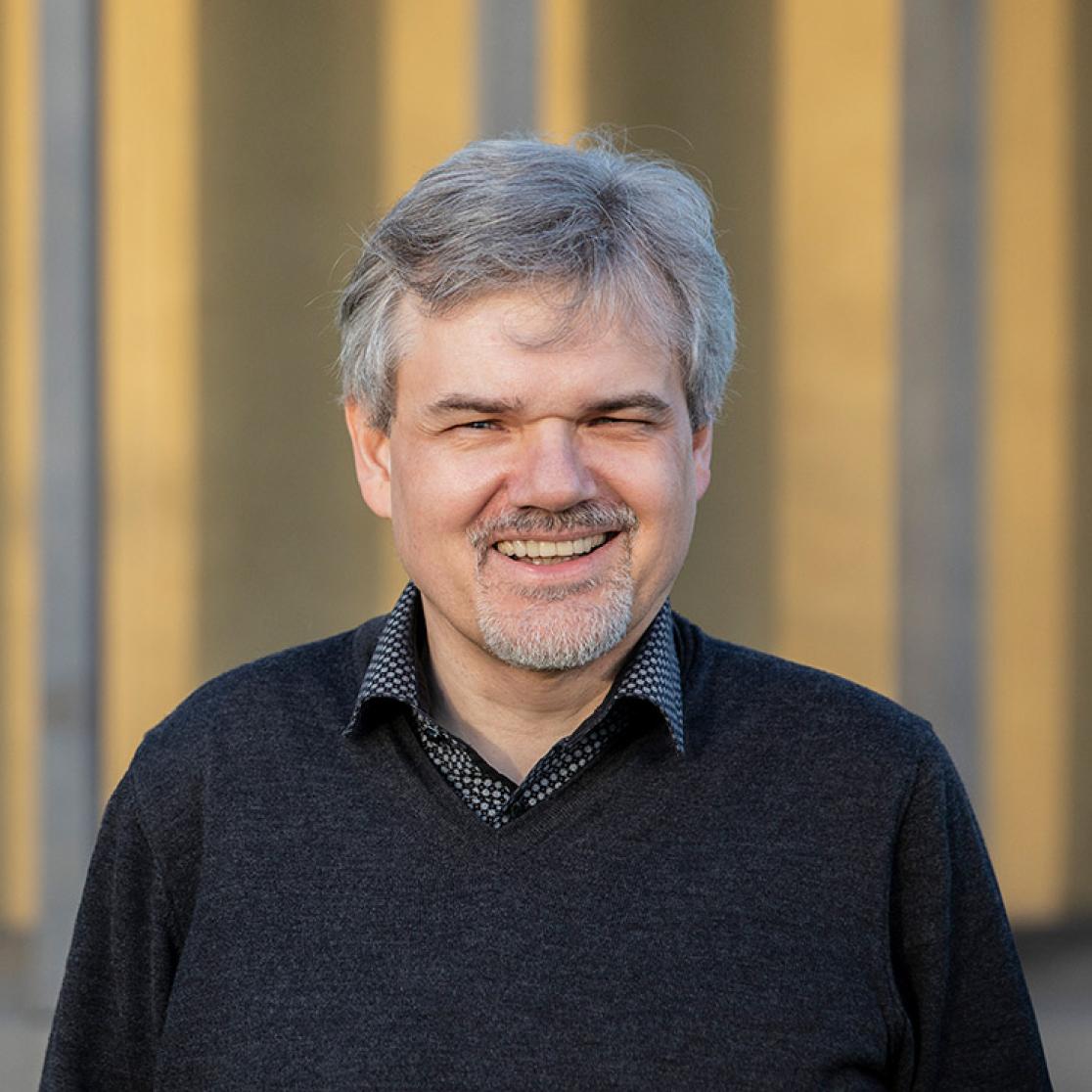
Rainer Goebel studied Psychology and Computer Science and has been professor of Cognitive Neuroscience at UM since 2000. He was one of the pioneers of fMRI and is internationally recognised for inventing BrainVoyager, a software tool for advanced analysis in neuroimaging. He has received numerous large grants and leads a major study in the Human Brain Project, a flagship project funded by the European Commission.
Also read
-
Empowering Smallholder Farmers in the Data Economy: Unlocking Opportunities and Overcoming Obstacles
Frederik Claasen, the head of policy at our partner organisation Solidaridad Network on the opportunities and obstacles facing smallholder farmers in their data ecosystems.
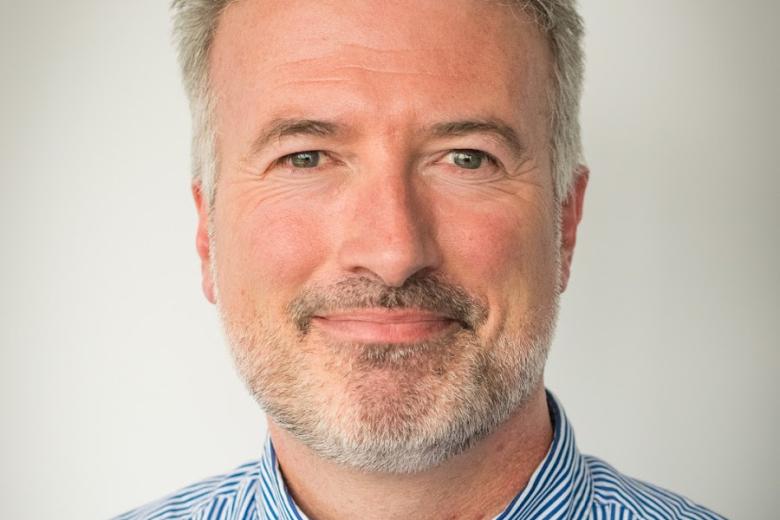
-
The last 'nerve doctor' in the Netherlands
Frans Verhey, professor of Geriatric Psychiatry and Neuropsychiatry is proud of what the Limburg Alzheimer’s Centre has achieved and of its team, which works tirelessly to improve the quality of life of people with Alzheimer’s. “Alzheimer’s tends to be seen as a horrible, deadly brain disease that...
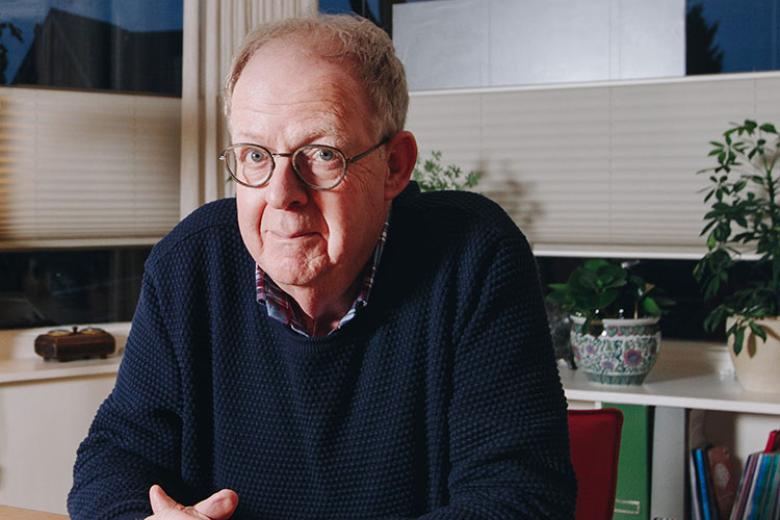
-
The scientist, the chef and her passions
Anne Roefs was awarded a Vici grant of €1.5 million. The professor of Psychology and Neuroscience of Abnormal Eating, was tossing up between a career as a scientist or a top chef.
